Since the story about freshman Rep. Katie Hill’s “throuple” relationship with a young female staffer broke last week, the common response from progressives in the media and Hill apologists has sounded something like this:
“It was a consensual relationship between two adults, and she wasn’t part of Hill’s Congressional staff, so it’s none of our business.”
But was the relationship really consensual? In the age of #MeToo, activists contend that when a large power imbalance exists, such as between a CEO and an employee, the employee is incapable of giving consent. Even assuming that true consent existed at the beginning of the relationship, the power imbalance could keep an employee in a bad relationship for fear that they will lose their job or suffer other negative consequences.
In the case of the Hill throuple, text messages between Kenny Heslep and Hill’s staffer from June 2019 depict an unhealthy, toxic relationship – Heslep even characterizes the way in which he and Hill treated the staffer as “abusive” as he apologizes for hurting her.
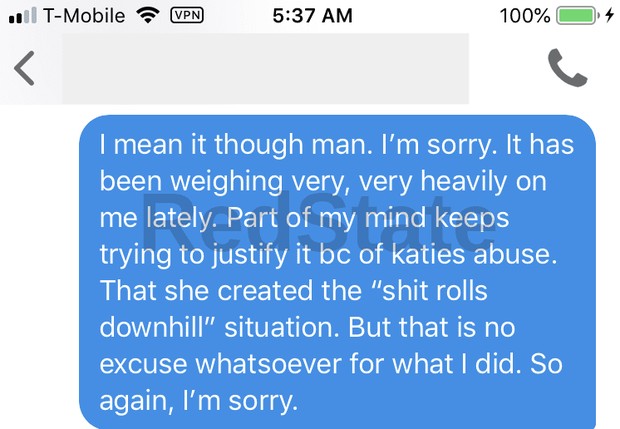
Heslep wrote:
“I mean it, though, man. It has been weighing very, very heavily on me lately. Part of my mind keeps trying to justify it because of katies abuse. That she created the ‘s**t rolls downhill’ situation. But that is no excuse whatsoever for what I did. So again, I’m sorry.”
The staffer replies:
“It was a dark time and you treated me really poorly but I also stayed which I have to own.”
Heslep assures her she doesn’t need to take full responsibility:
“Don’t take full responsibility for staying with people that are abusing you. That is basically victim blaming, and none of it was your fault. I’m sorry for how bad it got.”
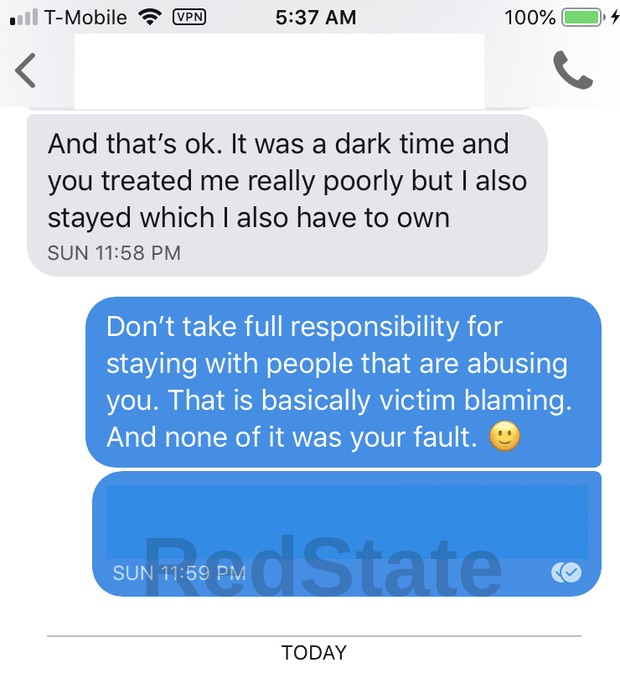
In a later message, the staffer herself characterized the relationship as “toxic.”
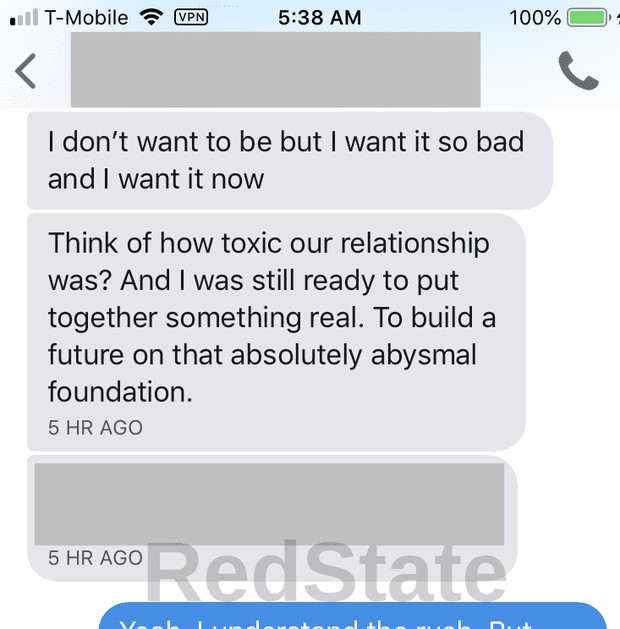
She was still ready to build a future with Hill and Heslep:
“Think of how toxic our relationship was? And I was still ready to put together something real. To build a future on that absolutely abysmal foundation.”
In another message from the staffer to Hill on June 3, 2019, the staffer said she was “terrified of pushing back” against Hill because she’d witnessed Hill’s behavior toward Heslep.
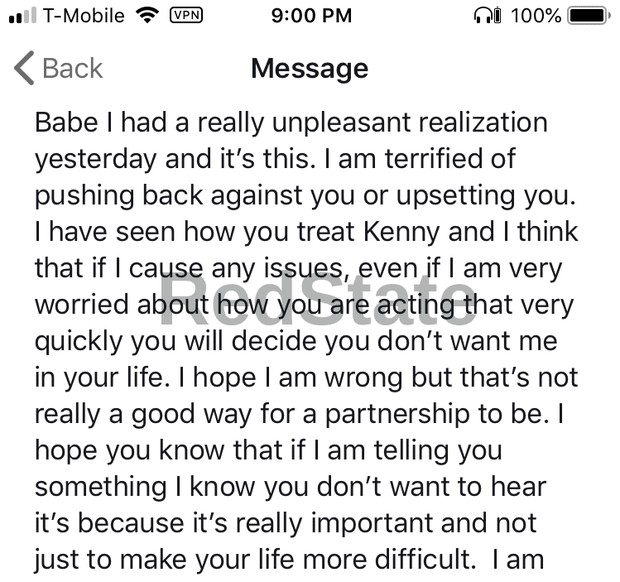
She continued:
“I think that if I cause any issues, even if I am worried about how you are acting, that very quickly you will decide you don’t want me in your life. I hope I am wrong but that’s not really a good way for a partnership to be.”
Clearly the young woman doesn’t want to be cut out of the life of the partner she loves, but she also risks losing her job and any upward mobility in her political career. In a text exchange between the young woman and Heslep on June 12, 2019, she references what she is losing in addition to the relationship.
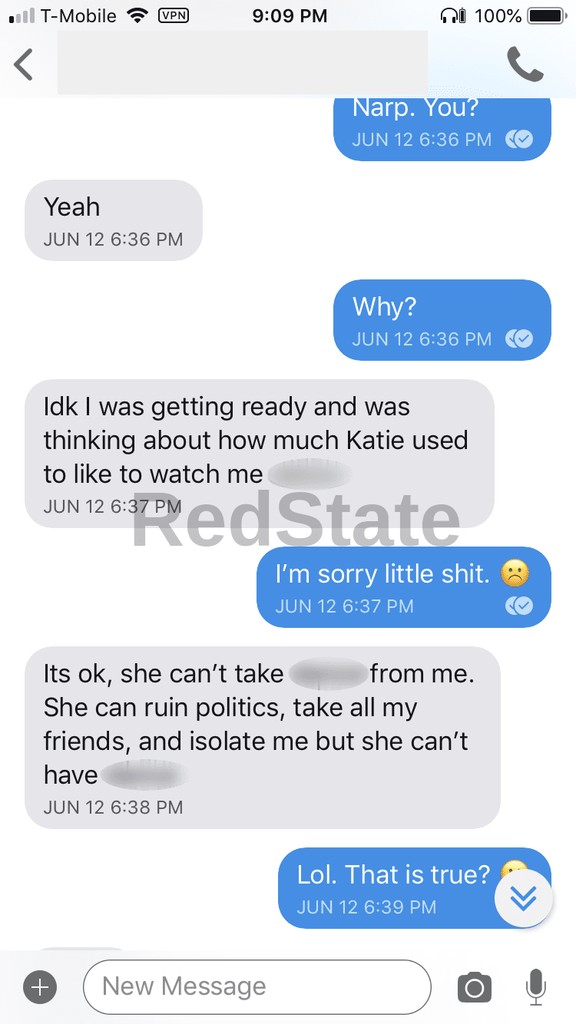
She told Heslep:
“Idk, I was getting ready and I was thinking about how much Katie liked to watch me [reference to a hobby]…It’s ok, she can’t take [this] from me. She can ruin politics, take all my friends, and isolate me, but she can’t have [this].”
The staffer continued her work on the campaign side despite the awkwardness and emotional distress it caused. Hill, however, seemed tone-deaf, asking her former lover to apply sunscreen on her prior to an event – in front of the rest of the staff. The young woman later texted Hill to express her displeasure.
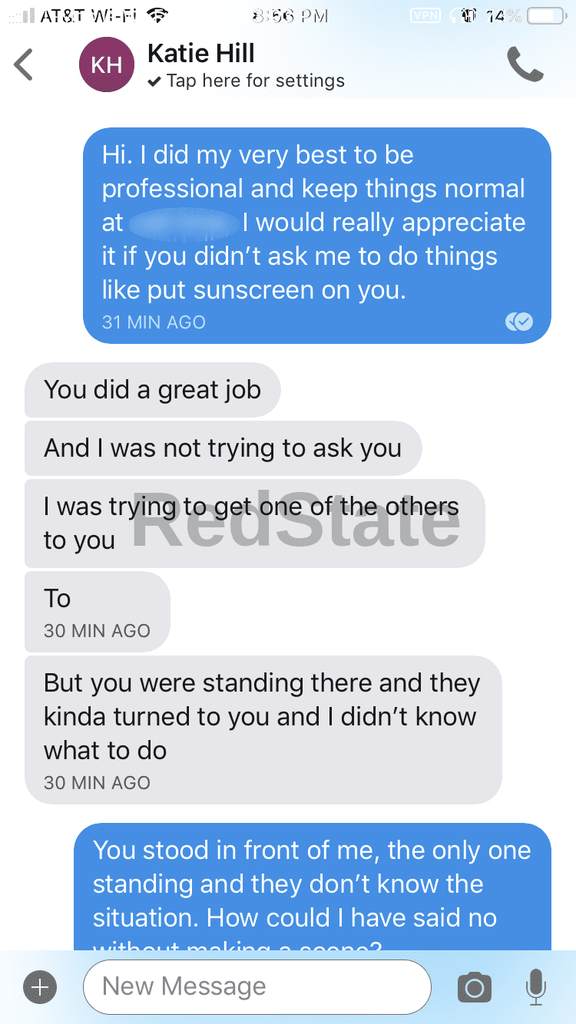
She said:
“Hi. I did my very best to be professional and keep things normal at [work]. I would really appreciate it if you didn’t ask me to do things like put sunscreen on you.”
Hill turned it around on the young staffer:
“You did a great job. And I was not trying to ask you. I was trying to get one of the others to. But you were standing right there and they kinda turned to you and I didn’t know what to do.”
Really? Hill couldn’t have directly approached a different staffer? She couldn’t have made something up about the chemicals in sunscreen bothering the staffer’s skin or some other excuse? Also, in any normal workplace, it would be extremely odd for a boss to ask a subordinate to apply sunscreen to them.
Returning to the consent issues between a CEO (Hill would be considered the CEO of both her campaign and her Congressional office) and a subordinate, the Washington Post reported that there is an attitude of “zero tolerance” for allegedly consensual workplace romances and that five high-profile CEO’s had been forced out of their jobs for consensual relationships since October 2017:
“Whatever the reason for the departure, employment lawyers say boards of directors at many companies are quicker to act in an era of increased media coverage about CEO transgressions, #MeToo misconduct that increases scrutiny of even consensual relationships and more demands on boards to hold chief executives accountable for risky behavior.”
The problem with a consensual relationship in the office goes beyond harm to the subordinate/victim; the relationship eventually affects others. In a 2018 essay in Harper’s Bazaar, Leila Gowland, an expert on workplace dynamics, writes:
“Many sexual harassment scandals stem from abuses of power—which makes them inherently problematic—and the problems that can result extend beyond the individuals engaging in sexual activity. When leaders enter into romantic or sexual relationships with subordinates, the risks are significant: actual or perceived coercion or favoritism, undermining of team dynamics, and damage to organizational culture.”
The age of the female staffer, combined with the power imbalance and Hill’s popularity as a progressive up-and-comer, also calls into question her ability to consent. A generation ago, another 22-year-old started a “consensual” relationship with her very powerful boss. That woman, Monica Lewinsky, wrote in 2018:
“Now, at 44, I’m beginning (just beginning) to consider the implications of the power differentials that were so vast between a president and a White House intern. I’m beginning to entertain the notion that in such a circumstance the idea of consent might well be rendered moot. (Although power imbalances—and the ability to abuse them—do exist even when the sex has been consensual.)
“The dictionary definition of “consent”? “To give permission for something to happen.” And yet what did the “something” mean in this instance, given the power dynamics, his position, and my age? Was the “something” just about crossing a line of sexual (and later emotional) intimacy? (An intimacy I wanted—with a 22-year-old’s limited understanding of the consequences.) He was my boss. He was the most powerful man on the planet. He was 27 years my senior, with enough life experience to know better. He was, at the time, at the pinnacle of his career, while I was in my first job out of college.”
Granted, Katie Hill wasn’t and isn’t the most powerful woman on the planet. She’s been held up as one of the shining stars of the new progressive wing of the Democrat party, though, and had HBO camera crews following her throughout her campaign, glowing write-ups in Elle, Rolling Stone, Politico, and more, and was quickly brought into party leadership upon her election. It’s understandable that the young staffer would be brought under Hill’s spell and confuse adulation with consent and love.















Join the conversation as a VIP Member